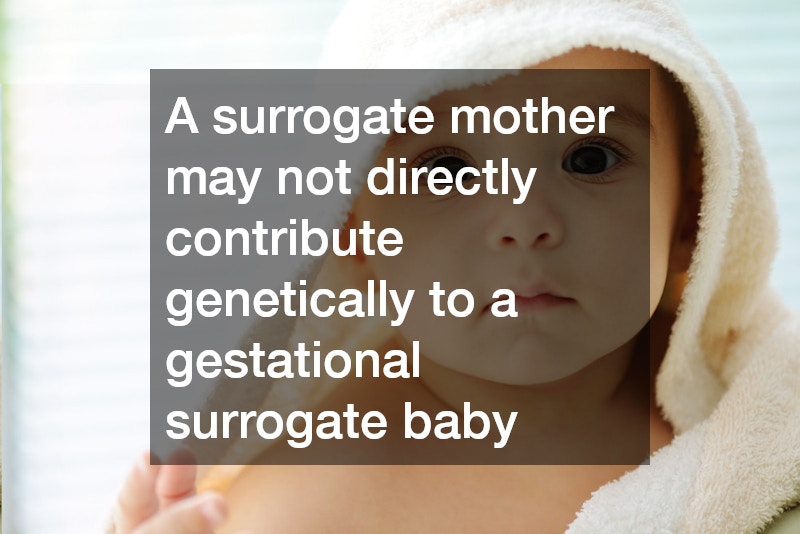Surrogacy is increasingly becoming a popular option for individuals and couples wishing to have children but facing challenges in conception. Essentially, what is a surrogate birth? It involves a woman, known as a surrogate mother, carrying and giving birth to a baby for someone else. Among various reasons, some people choose surrogate birth due to medical issues, age, or being part of a same-sex couple. While many consider the legal and emotional facets of surrogacy, an intriguing aspect lies in the characteristics a baby might gain from the surrogate mother.
Surrogacy arrangements can be quite complex, given the many variables involved. Broadly, there are two primary types of surrogacy – traditional and gestational. In a traditional surrogacy, the surrogate mother is also the genetic mother of the child because her eggs are used in the fertilization process. On the other hand, gestational surrogacy involves the implantation of an embryo created using the intended parents’ or donors’ genetic materials, so the surrogate does not contribute genetically.
Understanding the nature of surrogate birth is crucial to comprehending the dynamics of what characteristics a baby might inherit from the surrogate mother. Gestational surrogacy, now the more popular method, minimizes genetic transfer from the surrogate, but environment and prenatal influences still play significant roles. These factors can impact the physical and psychological development of the baby throughout the pregnancy. Thus, by fully understanding the implications of surrogate birth, parents embarking on this journey can make informed decisions that prioritize the best outcomes for their future child.
Genetic vs. Environmental Influence
In gestational surrogacy, the genetics of the baby stem entirely from the egg and sperm used in creating the embryo. This fundamentally means that the surrogate mother does not pass her genetic traits to the child. However, environmental and prenatal conditions can still significantly influence the child’s development. During pregnancy, a surrogate mother provides the prenatal environment, which is critical in shaping various aspects of fetal development, including health, temperament, and even intelligence.
The influence of the prenatal environment is evident in numerous scientific studies. Research indicates that prenatal factors such as maternal nutrition, stress, and health can affect the physical and cognitive development of the fetus. For instance, a study highlighted that maternal stress hormones could alter gene expression within the developing fetus, showcasing a link between prenatal environment and later life health outcomes. While genes provide the blueprint, the environment offered by the surrogate adds layers to the developing fetus’s characteristics.
While the contribution of the surrogate’s genetics might be negligible in gestational surrogacy, her lifestyle and health behaviors are immensely influential. A surrogate’s access to nutrition, healthcare, and her ability to maintain a stable and healthy environment can impact birth outcomes significantly. Parents considering surrogacy should contemplate these environmental factors and work closely with the surrogate to ensure optimal prenatal conditions. Therefore, the surrogate’s role goes beyond carrying the pregnancy, as her active participation directly affects the baby’s development.
Emotional and Psychological Traits
The impact of environment extends not only to physical traits but also to emotional and psychological characteristics. The nine months a child spends in the womb can shape aspects of their emotional health and personality. A calm and stress-free pregnancy is associated with better emotional regulation in a child. Consequently, the emotional state and well-being of a surrogate are of utmost importance. Positive surrogacy experiences often lead to healthier pregnancies, thereby contributing to the emotional and psychological health of the baby.
Psychological traits can indirectly be influenced by the emotional environment the surrogate provides during gestation. For example, studies have shown that a stress-free and emotionally nurturing prenatal experience can result in better adjustment and cognitive abilities in children. This highlights the importance of supporting surrogate mothers during pregnancy with adequate psychological care and resources. Additionally, building a good rapport between intended parents and the surrogate can contribute to a positive emotional environment for the baby.
Surrogacy is as much about emotional connection as it is about physical and logistical arrangements. The emotional state of the surrogate mother not only affects her well-being but also plays a critical role in nurturing the unborn baby’s emotional reservoir. As such, intended parents should nurture an open and supportive relationship with the surrogate throughout the pregnancy to foster positive outcomes. Therefore, the surrogate mother’s emotional resilience significantly contributes to the healthy psychological development of the baby.
Surrogate’s Influence Beyond Genetics
Although a surrogate mother may not directly contribute genetically to a gestational surrogate baby, her influence is far-reaching due to the prenatal environment she provides. Understanding what is a surrogate birth allows us to appreciate the complex interplay between biology and environment. It’s clear that the surrogate’s lifestyle, health, and emotional state all contribute significantly towards shaping the baby’s characteristics. Thus, acknowledging the surrogate’s role involves appreciating contributions beyond genetic traits.
Surrogacy presents unique challenges and opportunities that go beyond simply growing a family. Successful surrogacy requires careful coordination and understanding between intended parents and the surrogate. This ensures that the environment provided during gestation supports the healthiest start for the baby. By prioritizing optimal health, nutrition, and emotional well-being, we recognize the surrogate’s role as pivotal in developing a well-rounded individual. The balance between genetic intent and environmental nurturing embodies the heart of surrogacy’s essence.
For intended parents, recognizing the multifaceted role the surrogate plays centers around more than just the physical act of carrying a child. Every aspect – physical, emotional, and psychological – is paramount in crafting a positive surrogacy journey. Encouragingly, ongoing research continues to unravel the intricacies of how surrogate mothers influence their surrogated children beyond ancestry. Ultimately, informed and mindful surrogacy practices promise healthier and happier outcomes for everyone involved.
